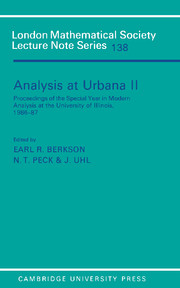Book contents
- Frontmatter
- Contents
- Acknowledgements
- PREFACE
- The C1contractions
- Factorization theorems for integrable functions
- Spectral decompositions and vector-valued transference
- Vector-valued Hardy spaces from operator theory
- Restricted invertibility of matrices and applications
- The commuting B.A.P. for Banach spaces
- The minimal normal extension of a function of a subnormal operator
- Two C*-algebra inequalities
- The generalised Bochner theorem in algebraic scattering systems
- Differential estimates and commutators in interpolation theory
- A survey of nest algebras
- Some notes on non-commutative analysis
- Some remarks on interpolation of families of quasi-Banach spaces
- An application of Edgar's ordering of Banach spaces
- Martingale proofs of a general integral representation theorem
The commuting B.A.P. for Banach spaces
Published online by Cambridge University Press: 05 September 2013
- Frontmatter
- Contents
- Acknowledgements
- PREFACE
- The C1contractions
- Factorization theorems for integrable functions
- Spectral decompositions and vector-valued transference
- Vector-valued Hardy spaces from operator theory
- Restricted invertibility of matrices and applications
- The commuting B.A.P. for Banach spaces
- The minimal normal extension of a function of a subnormal operator
- Two C*-algebra inequalities
- The generalised Bochner theorem in algebraic scattering systems
- Differential estimates and commutators in interpolation theory
- A survey of nest algebras
- Some notes on non-commutative analysis
- Some remarks on interpolation of families of quasi-Banach spaces
- An application of Edgar's ordering of Banach spaces
- Martingale proofs of a general integral representation theorem
Summary
Introduction. In light of Enflo's famous counterexample to the approximation problem [3], the study of “weaker structures” has gained added importance. The most fruitful of these has been the bounded approximation property (B.A.P.) (see section 2 for the definitions), the πγ-property, and the finite dimensional decomposition property (F.D.D.P.). Johnson, Rosenthal and Zippin [11] examined certain relationships between these weaker structures. Since 1970, this paper has been the standard reference for people working in the area. Essentially no further positive progress has been made on the important problem of finding general conditions which imply the F.D.D.P. for a Banach space X.
Enflo's example [3] was the first in a long series of important counterexamples in the area. Figiel and Johnson [4] then showed the existence of a Banach space which has the approximation property (A.P.) but fails the B.A.P.. Lindenstrauss (see [14]) found a Banach space X with a basis so that X* is separable and fails the A.P. Recently, S. J. Szarek [18] constructed a Banach space with the F.D.D.P. which fails to have a basis.
In the sequel, we will see that the much ignored concept of commuting B.A.P. (C.B.A.P.) plays a central role in passing from “weaker structures” to a F.D.D. for a separable Banach space. In section 2 we give the definitions and review the work to date on these problems. Section 3 is a study of C.B.A.P. and what conditions imply its existence.
- Type
- Chapter
- Information
- Analysis at Urbana , pp. 108 - 127Publisher: Cambridge University PressPrint publication year: 1989



